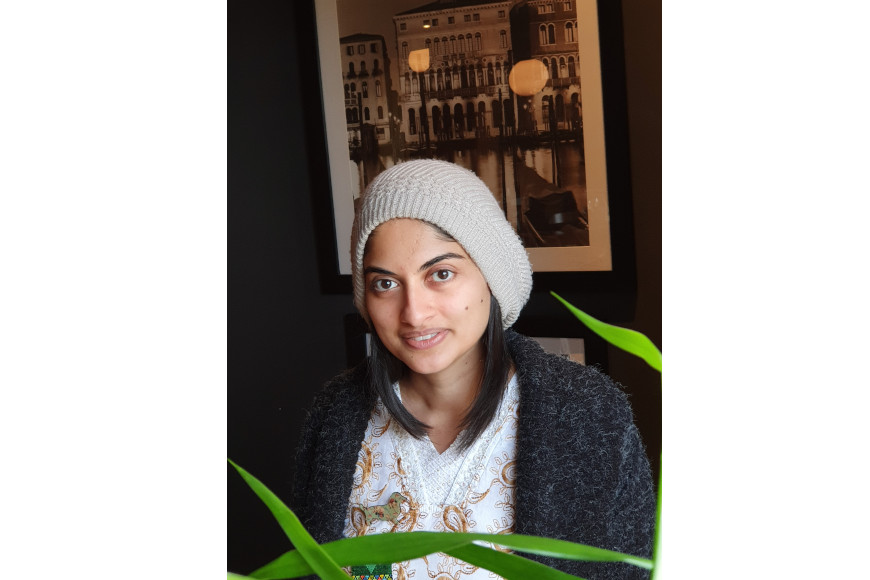Part-time lecturer for the Language Practice programme, Department of Media, Language and Communication, Faculty of Arts and Design, Ms Sana Ebrahim speaks of her passion for lecturing and nurturing students taking her academic classes at the Durban University of Technology (DUT).
“I lecture two General Education modules: Hands Filled With Meaning (HSWM101) in semester 1 to students in the Child and Youth Care programme; and Introduction to Sign Language (INSL101) in semester 2 to Chiropractic and Business and Information Management students. At the core of the second-year Sign Language modules lies a focus on empathy and compassion training through deaf culture that I am strongly passionate about,” said the charismatic Ebrahim.
Her journey into Sign Language was fuelled by a desire to make a difference. She wears several hats. Ebrahim is not only a Sign Language lecturer at DUT; but also a calligraphy workshop facilitator; freelance journalist; artist; poet; and creative entrepreneur.
“My Master’s dissertation was titled ‘Blending Deaf and Hearing Cultures: Scenarios for Social Cohesion’. I was drawn towards studying the deaf culture and sign language when I watched the Deaf Pavement Poets perform nature-themed sign language poetry at a COP17 event at Alliance Française de Durban, Morningside that I had coordinated in November 2011. My life is enriched through deaf friendships and honing empathy and compassion training skills,” she commented.
Ebrahim explained that the subjects she teaches incorporate with DUT’s ENVISION2030.
“I encourage my students to go beyond tokenism when aspiring to become an ally in the deaf community. The ENVISION2030 values of integrity, respect, fairness, commitment, and compassion are
foregrounded in establishing a good rapport with deaf people and forging deaf-hearing friendships, partnerships, and collaborations,” added Ebrahim.
Besides her love of lecturing, she spoke of her other passions which she tries to complement with her teaching and learning at DUT.
“I facilitate Hand Chats Roundtables at local eateries as a DUT Community Engagement project. I run English and Arabic calligraphy workshops on weekends. I am a member of the KwaZulu-Natal Society of Arts (KZNSA) Gallery and the Rich Ellis Drum Circle. I explore meditative arts as a mode of developing connectivity and harmony with people and the environment,” she said.
In terms of what is forthcoming that she would like to highlight in relation to her teaching; Ebrahim said her aim is to build interactive experiences that are spontaneously remarkable and transitory.
“Living narratives exemplify a multifaceted career that is designed to pay forward skills and talents through connecting the dots of knowledge acquired in the past. The COVID-19 lockdown has led to academic citizenship expanding the role of the lecturer to service that spotlights community engagement and blurring cognitive meaning-making boundaries,” she added.
Ebrahim further mentioned that the roles of educator and learner interplay to produce fluid reasoning that is boundless and transdisciplinary.
“My former Physics tutor and the Principal at Burnwood Secondary School, Vanesh Gokal (1964-2021) stressed that he doesn’t teach Physics; he teaches people. The postmodern age demands a Renaissance outlook grounded in the integral paradigm that revolutionises thinking to navigate everyday life. The creative toolkit foregrounds lifelong learning and growing talent and business potential,” commented Ebrahim.
“Learning does not have to be relegated to a single platform or methodology. Wired for curiosity, our minds are constantly innovating and refining our practice towards making a major contribution to humanity that transcends our lifetime,” she relayed.
Her advice to first -year students who are embarking in Sign Language programmes is to start by learning the South African Sign Language (SASL) alphabet; numbers; The Five Parameters of Sign Language; Deaf and hearing etiquette; sign names; and SASL vocabulary linked to themes such as family, pets, food, colours, and transport.
“Pay forward your talents and skills by reaching out to marginalised communities and integrating them into mainline society. Global deaf awareness highlights the deaf cause; bridging the communication gap through learning sign language, and enhancing socially cohesive environments,” stressed Ebrahim.
Pictured: Ms Sana Ebrahim
Waheeda Peters


